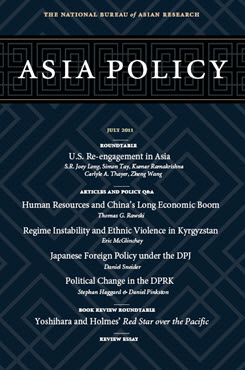Human Resources and China's Long Economic Boom
This article argues that China’s protracted economic boom rests on a long-term historical accumulation of skills and capabilities that extends far beyond the typical complement of human assets available to low-income nations.
EXECUTIVE SUMMARY
MAIN ARGUMENT
An unusually rich complement of human resources accumulated prior to 1949 has played a central role in powering China’s continuing economic boom. This legacy of human capital is particularly apparent in the initial stage of China’s post-1978 boom, when rural communities shrugged off two decades of hunger and relentless anti-business propaganda to welcome modest reforms with an outpouring of entrepreneurial initiative. A survey of historical and contemporary evidence highlights the depth and breadth of economic capabilities in China’s traditional rural society as well as the substantial expansion of human capital resulting from post-1949 initiatives. Cross-national comparisons focusing on the fortunes of overseas Chinese and on business formation in transition economies highlight the distinctive business acumen and organizational capabilities inherent in Chinese communities, particularly in regions with histories of deep involvement in trade and migration.
POLICY IMPLICATIONS
While not discussed in the article, this analysis has clear implications for policymakers.
- China’s ongoing economic boom is firmly rooted in the economic and organizational capabilities of the country’s populace. Arguments attributing Chinese economic gains to currency manipulation, subsidies, cheap loans, unfair trade practices, and other ephemera make good political rhetoric but have little economic merit.
- The availability of exceptionally strong human resources, including administrative and management skills in the public sector, makes China’s economy resilient in the face of setbacks. China’s current government is a world leader in reversing economic difficulties arising from war, hyperinflation, disorganization, famine, civil strife, and SARS, as well as fallout from international financial upheavals in the late 1990s and again in 2008–9. Herd behavior among Western media hoping or fearing that the latest strike, civil unrest, environmental upset, or mine disaster will destabilize the Beijing regime seems far-fetched. The Chinese state, fortified by rapidly growing financial as well as human resources, is well-positioned to deal with unexpected challenges. In the absence of major breakdowns in domestic political stability or global markets, we should expect further advances in the quantity and quality of China’s economic output.
About Asia Policy
Asia Policy is a peer-reviewed scholarly journal presenting policy-relevant academic research on the Asia-Pacific that draws clear and concise conclusions useful to today’s policymakers. Asia Policy is published quarterly in January, April, July, and October and accepts submissions on a rolling basis. Learn more


